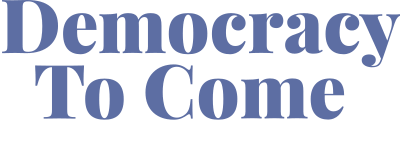“The democratisation of research has been identified as one of the key methodological challenges of the 21st century” (Edwards and Brannelly, 2017)
Over the past few years my work on democracy and organizations has led me to conduct a variety of empirical projects. I have documented many of them on this website ranging from interview-based studies to those incorporating action research, in which organizational members and consultants were actively involved in the research design and data collection process. Traditional academic research (and the methodologies used to produce it) have long been criticised as being elitist and exclusionary, falling short of many of the democratic values of transparency, inclusivity and equity that we hold dear in other spheres of our lives. It might be no surprise then that when designing new projects, the question keeps arising for me and my colleagues: how democratic can we make the methodology we are employing? So, for instance, how far can we make interviews a democratic process in which we incorporate a collective mechanism to generate questions and even conduct the interview itself? To what extent can we collectivise the data analysis process so that it goes beyond individualistic interpretation and broadens the lessons we take from the data we produce? And what other ways can we democratise the methodological process from idea generation to dissemination of our findings so that we not only espouse the values of democratisation within organization but live them through the academic processes that we use on a day-to-day basis?
In July 2024 I had the opportunity to engage with some of these questions at the European Group for Organization Studies (EGOS) Conference in Milan (at the University of Milano-Biccoca). I was there for two unrelated projects I am working on which engage with the idea of democratising methodologies. The first of these is a project led by Prof. Ellen Nathues (Leuphana University), Dr. Monica Nadegger and my University of Sheffield colleague Dr. David Hollis. For a few years now they have been running the CCO data collective, a community where scholars, researchers, students, and practitioners who share a common interest in Communication as Constitutive of Organization (CCO), relationality, and/or performativity meet virtually (or occasionally in person!) to analyze and theorize data excerpts. Data might include, for instance, excerpts from interviews, audio visual footage from within organizations, social media posts about professions, that will be “worked through” by a collective of anything between 10 and 40 people in an attempt to broaden the range of interpretations of the data.

It was fascinating to watch the collective provide an analysis of the presenter’s data that was both broad in scope and also altruistic in nature. The end product was something that the individual could take away and do whatever they wanted to further their own project. In fact, my specific role in this particular session was a rather simple one – to video record the presentations of data and capture the different interpretations on film, so on this occasion the presenter even has a video record of the analysis to reflect upon and work with later. Our main reason for recording, however, was to help us as a small group start to critically reflect on the collective analysis process as we attempt to learn more about democratic methodologies, how they work and how they can be improved. We have been interviewing participants about their experiences in collective analysis and will be doing further interviews in the coming weeks with the hopes of understanding this emerging, alternative way of doing research. We have also had a super talented research assistant conducting a broad literature search/review on democratic methodologies which has been fascinating to hear and read what is already happening in the research community, from collaborative zoom coding to collective qualitative analysis and pluralistic analysis. Hopefully in the coming months we can write some outputs based on our own experiences with democratic methodologies and I shall be sure to post these developments when we do.
The second project I was involved with is one of those lovely (rare) projects that emerges as an idea and seemingly develops into a paper extremely quickly. The basis of this project is to explore the very process of evidence gathering and analysis within academia by considering the potential for democratising the research process. To do so, my colleague Prof. Daniel King and I, have used the What Works approach as a departure point as a more traditional vision that we can contrast our alternative, democratic approach. The what worksapproach is an evidence-based decision-making movement which suggests “that good decision-making should be informed by the best available evidence. If evidence is not available, decision-makers should use high-quality methods to find out what works.” It was most clearly brought into life in the UK through the establishment of the What Works Centres. Traditionally the What Works centres seek to fill policy and practice relevant gaps in evidence through increasingly robust evidence using comparable metrics, to seek to bring about change. The central assumption is that effectiveness and efficiency will be improved if those making decisions base them on robust research evidence combined with professional judgment. Using the best available evidence, better decisions can be made. In doing so, scholars, practitioners and even policymakers, are able to help shape organizational change in ways that will lead to more positive change.

Our paper presented in Milan provides an exploration of this account – the assumptions and approaches it takes to evidence gathering and analysis – as we suggest how it might encourage a somewhat exclusive, undemocratic and elitist approach to working through evidence. In contrast we develop an alternative critical and, above all, democratic approach to What Works. In doing so, we ask: What might a critical approach to what works look like? How might a critical approach to what works most appropriately be formed and developed over time? In what ways might it differ from a traditional approach to what works and what barriers and resistance might it face in being formulated? And finally, how would we judge the effectiveness of a critical approach to what works over an issue such as the democratisation of workplaces? It is these kinds of methodological questions that we are starting to engage with here within this paper on a theoretical level. In doing so, we are seeking to lay the foundations for an empirical exploration of a democratised approach to What Works. More to follow on this in the coming weeks as we finalise a paper for submission to a journal.
Overall, Milan was a highly productive and interesting conference in a beautiful setting. It was my first time in this vibrant and sprawling city and amongst the highlights was seeing the Duomo Cathedral in the city square. It was one of those buildings like the Houses of Parliament or Durham Cathedral where you genuinely wonder how it was built by humans. The kind of building that we, as a society, would probably struggle to build if we were to do so today. It was a truly amazing sight and really topped off the conference trip with something spectacular.






